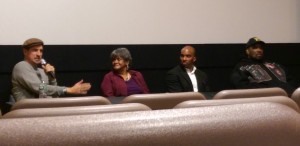Last Thursday, I had a great time watching the filming of Hamlet from the National Theatre in London. I never actually read or watched Hamlet before this, despite having read Macbeth three times throughout middle and high school. Nevertheless, I was going into this knowing very little about Hamlet. I knew about the “to be or not to be” soliloquy and had a vague understanding that The Lion King was Hamlet-esque, but I really enjoyed the performance because it was super engaging, especially because I did not know exactly what was going to happen. I found myself rooting for Hamlet, though I knew he was going to die, because it is, after all, a Shakespearean tragedy. I didn’t realize how often Hamlet gets referenced by other things, as I was often surprised by famous lines that I never knew were attributed to Hamlet. I definitely want to go through and actually read the play to catch more nuances, but I do think watching Shakespeare is more enjoyable than just reading it. I think if anyone doesn’t understand the appeal of Shakespeare, they should find a chance to watch this performance.
One thing I was really impressed by was the staging. It was amazing. The play opened with the small space in front of a backdrop, and I was shocked by how big it was once the scene changed. The front area looked like a normal sized stage, but the back part was a pitched hallway. I’m not sure how steep the incline was, but seeing the actors running up it seemed like hard work, and when Ophelia walked to the back and into the bright light in the distance, it looked pretty steep. Also, the stage effects for the closing of the scene right before intermission were awesome. Like actually awe inspiring. I wasn’t sure exactly what was being blown around, but I did wonder about how they were going to clean up all of it during the intermission. Turns out, they didn’t have to. It created the perfect outdoor setting for the later scenes. I really liked how they used the set very smartly throughout the entire show.
At first, I was confused by the costuming because of the mixture of more period appropriate pieces and plaid with hipster glasses, but it didn’t seem to detract from the performance. Actually, when Hamlet came out with a David Bowie t-shirt, it oddly fit the really well. I wasn’t too fond of Ophelia’s clothing, but being one of the only major female roles, perhaps it was just too different from the rest of the costumes to make sense to me. I’m not sure how it was originally written, but seeing Benedict Cumberbatch in a toy soldier outfit marching and playing in a kid’s castle was great.
Another thing I appreciated was the camerawork. I was afraid that it was going to be a stationary taping of the whole stage, which some theaters do, but the camera changes added to the performance. Focusing in on certain character’s actions and reactions helped direct the audience to exactly what was supposed to be featured. Also, it probably was a better point of view than it would have been from a live audience perspective because certain isolated scenes could be zoomed in on so the characters didn’t seem too small, which I would imagine they might on such a big stage.
I do enjoy reading Shakespeare, but I think watching it provides a better experience, because they were written to be played. Going into it without having read the play, I was really excited by certain parts, but I would definitely watch this version again after reading it to try and catch different parts that may have gone over my head.

